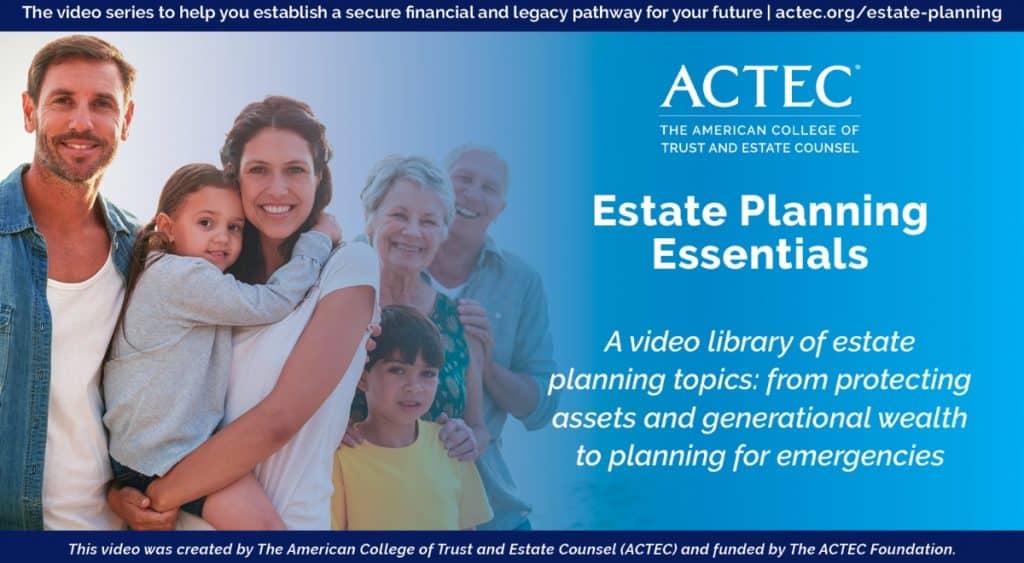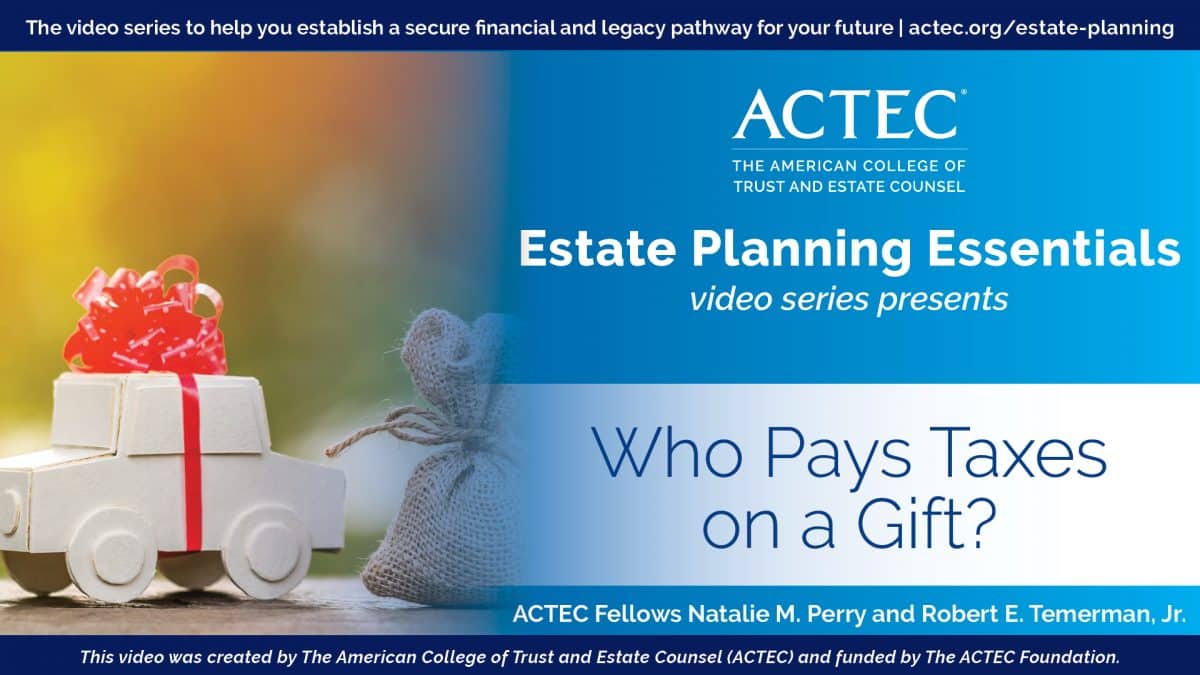The estate tax exemption is the maximum value of assets an individual can leave to their heirs upon death without incurring federal estate tax. The estate tax exemption is the total amount of gifts an individual can give to others during their lifetime without incurring gift tax. The lifetime gift tax exemption amount was $11.58 million in 2020 and increased to $11.7 million in 2021. It is essential to understand that this exemption is scheduled to decrease to six million dollars in 2026.
ACTEC Fellows Jean Gordon Carter and Larry H. Rocamora review the basics and discuss how it works.
Transcript
I’m Jean Carter an ACTEC Fellow from Raleigh, North Carolina, and I have with me Larry Rocamora, who is an ACTEC Fellow from Durham, North Carolina. Our topic today is, should I use my estate tax exemption now? Larry, let’s start with the basics.
Tell us what we’re talking about.
Basics of the US Tax System
Larry Rocamora: Thanks, Jean. I think to understand the basics you have to first start off with understanding the US Wealth Transfer Tax system. There are really two things to understand. First, you have unlimited gifts that you can give to your spouse, who is a US citizen, and there’s no tax at all. Second, you can also do that to charitable organizations as well.
Now above that, you can give what is called the exemption amount to anybody and pay no tax, but any dollar above that exemption amount is taxed at 40 percent. The exemption amount right now is 11.58 million dollars, and that is historically high. So a lot of this may not apply if your estate is below that, but the exemption is scheduled to go back down to six million dollars and change in 2026. So again, it depends on the size of the estate as to whether the exemption amount will affect you or not.
The other thing is that if you’re married and you leave everything to your surviving spouse, there’s not a tax at the first death and if the spouse files a tax return, they can inherit the first spouse that dies’ exemption amount. So, you can leave up to 22 million dollars to your heirs and not pay estate tax; or even if it goes down to 6 million, 12 million dollars to your heirs and pay no estate tax if you’re married and file. This election is called “portability.”
Jean Carter: So, is it good, generally, to make gifts?
Larry Rocamora: Well, Jean, I have to give you a lawyer’s answer. It depends. It’s always good to make gifts to the donee who receives them. They can use the assets now that can help their lives, and so that is a good part about making gifts. In addition, making a gift now gets that future appreciation out of your estate. So that if you make a gift and the asset grows, that growth is not going to be subject to estate tax. An example may be helpful. Let’s assume you have Apple stock, you bought it at $50,000 and it’s now worth $100,000 and you give it to your child. Well, you’ve used $100,000 of your exemption because there’s a lifetime exemption as well that is unified. So you’ve used $100,000 of your exemption, but if Apple grows to $300,000 at your death, that $200,000 escapes estate taxation. So that’s the good part. Now when you die after giving that amount away – you’ve used $100,000 of your exemption. You only have 11 million four hundred and eighty thousand dollars left. The bad part about giving is that the donee receives the basis of the donor for tax purposes. So, in my example, the $50,000 that I paid for Apple — that’s what my child receives and when he sells that stock or she sells that stock, they’re going to pay capital gains on the difference between fair market value and $50,000. If I kept the stock til I died, then they would receive it at the $300,000 fair market value basis and can sell it and pay no estate tax. So, the bad part about giving is you don’t get what we call that step-up in basis. The good part about giving is that $200,000 increase escapes the estate taxation altogether. The other thing about gifting is you can give $15,000 per person per year away and it doesn’t affect that unified exemption amount. It doesn’t have any effect on it at all; and so, you can give $15,000 per person, per spouse, per in-law, and still have the same exemption remaining.
Jean Carter: Now, back to our topic. Should people go ahead and use their exemption now?
Using Your Gift Tax Exemption
Larry Rocamora: I always think it’s better to give away assets now if there’s a possibility you will be subject to estate taxes when you die at the 40 percent rate that it currently is, or if it could increase. We don’t know what the tax laws are going to be in the future. So making gifts now guarantees your use of that exemption without having to worry about it and you get the future appreciation on those gifts outside your estate as well.
Jean Carter: Okay. What if I can’t afford to give away, today, $11,580,000?
Larry Rocamora: A lot of times, we have one spouse make the gift in a trust for the benefit of the surviving spouse and family. Then that spouse can make distributions from the trust to themselves and use it back for the donor spouse. So, you can retain access to the trust property by giving it away, getting it out of your estate and still have the use of it, provided your spouse lets you. So, it’s always up to the spouse. Once you give it away, it’s a gift; and if that spouse dies, you won’t have access to it and you have to use some other techniques that you might be able to do to continue to have some access if you ever need it. Again, you never want to give away more than what you need to live on. You need to keep that forever.
Jean Carter: Well, this is very interesting. Larry, do you have any final thoughts on this topic?
Using Your Annual Exclusion
Larry Rocamora: Well, I’ve enjoyed being with you. Again, I think it’s better to give than receive. So, giving now is good. Use your annual exclusions. If you have highly appreciated assets, it is better to keep those and give assets with high basis — things like cash that has a high basis – and to get that future appreciation out as long as you can afford to do so.
Jean Carter: Larry, thank you very much for your time this morning.
Featured Video
Who Pays Taxes on a Gift?
Learn about the significance of gift and estate tax exemptions and differences depending on your state when considering a lifetime gift in estate planning.
ACTEC Estate Planning Essentials

ACTEC Fellows provide answers to frequently asked trust and estate planning questions in this video series.



